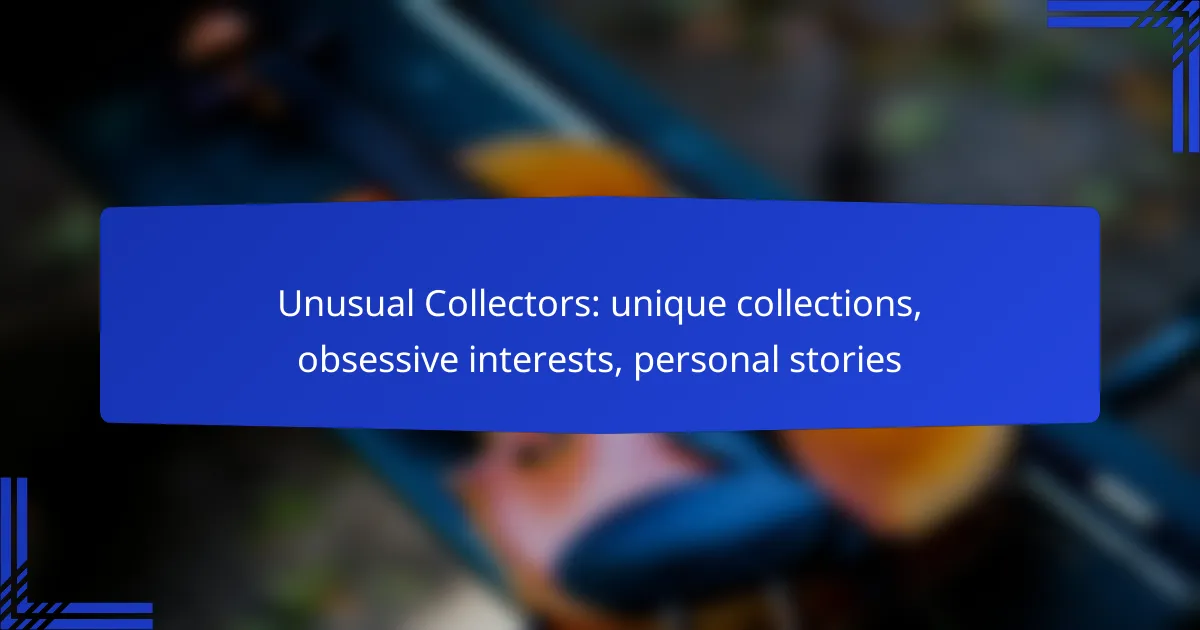Unusual collectors often curate unique collections that reveal their personal passions and histories, ranging from rare artifacts to contemporary art. Driven by a blend of personal experiences and community influences, these collectors develop obsessive interests that fuel their pursuit of specific items. Each collection is often intertwined with personal stories, reflecting significant life events or childhood fascinations that shape their collecting journey.

What are unique collections in Canada?
Unique collections in Canada encompass a wide range of items that reflect personal interests and passions. These collections can vary from rare artifacts to contemporary art, showcasing the diverse tastes and histories of Canadian collectors.
Rare stamp collections
Rare stamp collections are a popular pursuit among Canadian collectors, often focusing on specific themes such as historical events or geographical regions. Collectors typically seek stamps that are limited in quantity, have unique printing errors, or feature notable figures.
When starting a rare stamp collection, consider joining local philatelic societies, which can provide valuable resources and networking opportunities. It’s also essential to familiarize yourself with grading systems to assess the condition and value of stamps accurately.
Vintage toy collections
Vintage toy collections attract enthusiasts who appreciate nostalgia and craftsmanship, with items ranging from classic action figures to intricate model trains. Collectors often focus on specific eras, such as the 1950s to 1980s, when toy production saw significant innovation.
To build a vintage toy collection, research popular brands and models, attend toy fairs, and connect with other collectors online. Be cautious of reproductions and ensure authenticity by verifying provenance and condition before making purchases.
Local art collections
Local art collections in Canada highlight regional artists and cultural movements, allowing collectors to support their communities while acquiring unique pieces. These collections can include paintings, sculptures, and mixed media works that reflect local themes and narratives.
Engaging with local galleries and art fairs is an effective way to discover emerging artists and build a collection. Consider setting a budget for purchases and focusing on pieces that resonate personally, as this can enhance the enjoyment and meaning of your collection.

How do collectors develop obsessive interests?
Collectors often develop obsessive interests through a combination of personal experiences, community influences, and psychological factors. These elements intertwine to create a deep passion for specific items or themes, driving individuals to pursue their collections with fervor.
Personal experiences
Personal experiences play a crucial role in shaping a collector’s interests. For many, childhood memories associated with certain objects, such as toys or stamps, can ignite a lifelong passion. For example, someone who collected baseball cards as a child may continue to seek rare editions as an adult, driven by nostalgia.
Additionally, significant life events can trigger new collecting interests. A trip abroad might inspire someone to collect local art, while a family heirloom could lead to a fascination with antiques. These personal connections often enhance the emotional value of the collection.
Community influences
Community influences significantly impact the development of obsessive interests among collectors. Engaging with like-minded individuals through clubs, online forums, or social media can provide encouragement and motivation. These communities often share tips, resources, and opportunities for trading or purchasing items.
Moreover, events such as conventions or exhibitions can expose collectors to new trends and items, further fueling their passion. Being part of a community creates a sense of belonging and can deepen the commitment to a particular collection.
Psychological factors
Psychological factors also contribute to the development of obsessive interests in collecting. Many collectors experience a sense of satisfaction and fulfillment when acquiring new items, which can lead to a cycle of continued collecting. This behavior is often linked to the dopamine release associated with achieving goals.
Additionally, some collectors may find comfort in the structure and organization that collecting provides. The act of categorizing and displaying items can serve as a coping mechanism for stress or anxiety, making the hobby not just enjoyable but also therapeutic.

What personal stories inspire unusual collections?
Personal stories often serve as the foundation for unusual collections, reflecting individual passions, experiences, and memories. These narratives can stem from childhood interests, significant life events, or unique encounters that spark a desire to collect specific items.
Collector interviews
Interviews with collectors reveal the motivations behind their unique collections. For instance, a collector of vintage postcards may share how a family trip to a historical site ignited their passion for capturing memories through postcards. These conversations often highlight the emotional connections and personal histories that drive their collecting habits.
Additionally, collectors frequently discuss the challenges they face, such as sourcing rare items or the emotional toll of letting go of pieces. Understanding these aspects can provide insight into the dedication and commitment involved in building a collection.
Documented journeys
Documented journeys of collectors often illustrate the lengths they go to acquire specific items. Many collectors maintain blogs or social media accounts to share their adventures, showcasing the places they visit and the stories behind their finds. For example, a collector of antique toys might document visits to flea markets and auctions, providing a glimpse into the thrill of the hunt.
These journeys not only highlight the physical aspects of collecting but also emphasize the personal growth and learning that occur along the way. Collectors often discover new interests and communities through their experiences, enriching their collecting journey.
Community events
Community events play a significant role in fostering connections among collectors. Local fairs, conventions, and meetups provide opportunities for collectors to share their stories and showcase their collections. These gatherings often feature workshops, panel discussions, and networking opportunities that can inspire new collecting directions.
Participating in community events can also help collectors stay informed about market trends and valuation changes. Engaging with fellow enthusiasts can lead to valuable exchanges of knowledge and resources, enhancing the overall collecting experience.

What are the benefits of collecting unique items?
Collecting unique items offers various benefits, including emotional satisfaction, opportunities for social interaction, and potential financial gains. These advantages can enhance personal well-being and create meaningful connections with others who share similar interests.
Emotional fulfillment
Collecting unique items can provide a deep sense of emotional fulfillment. The thrill of finding rare pieces often leads to joy and excitement, which can boost overall happiness. Additionally, each item can carry personal significance, serving as a reminder of cherished memories or milestones.
Collectors often develop a strong attachment to their collections, which can provide comfort and a sense of identity. This emotional connection can be particularly beneficial during challenging times, as engaging with a collection can serve as a healthy distraction and a source of pride.
Social connections
Unique collections can foster social connections among like-minded individuals. Joining clubs, attending conventions, or participating in online forums allows collectors to share their passions and exchange knowledge. These interactions can lead to friendships and a sense of community.
Moreover, showcasing collections at exhibitions or local events can enhance visibility and attract fellow enthusiasts. Engaging with others who appreciate similar items can lead to valuable discussions and collaborations, enriching the collecting experience.
Investment potential
Collecting unique items can also serve as a viable investment strategy. Certain collectibles, such as vintage toys, rare coins, or limited-edition art, can appreciate significantly over time. Understanding market trends and demand is crucial for maximizing investment potential.
When considering collectibles as investments, it’s essential to research the market and focus on items with a proven track record of value increase. However, collectors should be aware that not all items will appreciate, and some may even lose value. Balancing passion with practicality is key to successful collecting.

What challenges do collectors face in Canada?
Collectors in Canada encounter various challenges that can impact their ability to build and maintain their collections. These include market fluctuations, space limitations, and the complexities of sourcing items across a vast country.
Market fluctuations
Market fluctuations can significantly affect the value of collectibles in Canada. Prices for items can vary widely based on trends, demand, and economic conditions, making it crucial for collectors to stay informed about market dynamics.
For example, collectibles like vintage toys or rare coins may see price spikes during certain periods, while others may decline in value. Collectors should regularly consult price guides, attend auctions, and follow online marketplaces to gauge current values.
Space limitations
Space limitations are a common issue for collectors, especially in urban areas where real estate is at a premium. Many collectors find it challenging to store their items safely and display them attractively without overcrowding their living spaces.
To manage space effectively, collectors can consider using shelving units, display cases, or even dedicated storage facilities. It’s also wise to periodically evaluate the collection and consider selling or trading items that no longer fit their focus or interest.
